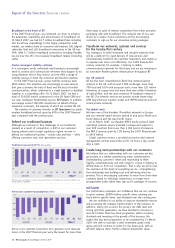BT 2007 Annual Report Download - page 21
Download and view the complete annual report
Please find page 21 of the 2007 BT annual report below. You can navigate through the pages in the report by either clicking on the pages listed below, or by using the keyword search tool below to find specific information within the annual report.Post-balance sheet acquisition
In April 2007, we entered into a conditional agreement to
acquire Comsat International – a leading provider of data
communication services for corporations and public sector
organisations in Latin America – through its parent company,
CI Holding Corporation. Comsat International employs more than
700 professionals with in-depth knowledge of Latin American
markets and provides services directly in 15 countries. It has a
track record in the delivery of complex projects and the
management of network solutions for enterprise, public sector
and carrier customers.
REGULATION, COMPETITION AND PRICES
BT operates in an increasingly competitive and dynamic
commercial environment, both in the UK and around the world.
The 2006 financial year saw the most significant change to
the UK regulatory regime since BT was privatised when, in
response to Ofcom’s strategic review of telecommunications,
we proposed a number of legally-binding Undertakings under
the Enterprise Act 2002 (the Enterprise Act). These Undertakings
were accepted by Ofcom and came into force in September
2005. (See BT’s Undertakings under the Enterprise Act on
page 21)
The Undertakings are intended to deliver clarity and certainty
to the UK telecommunications industry, with regulation focused
on the bottleneck parts of the network, and over time rolled
back elsewhere, to the benefit of consumers and others in the
marketplace.
This is mainly being achieved through Openreach’s operations
– offering certain products and services to all communications
providers in the same way – and through other widespread
organisational and systems changes. Since the Undertakings
came into force, we have made good progress in delivering
our obligations.
Other regulatory highlights in the 2007 financial year
included achieving deregulation in wholesale international
services markets, the ending of retail price controls and the
ending of our pricing commitments on wholesale calls. Ofcom
is currently carrying out a market review of the wholesale
broadband access market and is expected to carry out three
further market reviews in the 2008 financial year. (See
Significant market power conditions)
Regulation in the UK
UK regulation is conducted within a framework determined by
various EU (European Union) directives, regulations, and
recommendations. This framework is currently under review by
the European Commission and proposals for revised EU directives
are expected towards the end of the 2007 calendar year,
although they are unlikely to take effect in the UK before 2010.
Our policy is to comply fully with the regulatory framework in
which we operate, while competing fairly and vigorously within
the rules.
Ofcom
The Office of Communications (Ofcom) was set up under the
Office of Communications Act 2002 to provide a single, seamless
approach to regulating the entire communications market. Its
principal duties are to further the interests of citizens in relation
to communications matters and to further the interests of
consumers in relevant markets, where appropriate by promoting
competition.
Regulation takes the form of sets of conditions, mostly laid
down by Ofcom under the Communications Act 2003
(Communications Act), and directions under these conditions.
Some conditions apply to all providers of electronic
communications networks and services; others apply to
individual providers which are designated as having a USO
(universal service obligation) or, following a review of relevant
markets, are found to have SMP (significant market power),
which is aligned with the competition law concept of
dominance.
Other more general types of obligations are set out in the
Communications Act.
Conditions applying to all providers of electronic
communications networks or services
General conditions
The general conditions made by Ofcom under the
Communications Act apply to all providers of electronic
communications networks or services. Although these conditions
are concerned primarily with consumer protection, they also
address issues such as general access and interconnection
obligations, standards, emergency planning and numbering.
A separate condition regulates the provision of premium rate
services.
Electronic Communications Code conditions
The Electronic Communications Code applies to communications
providers authorised to carry out streetworks and similar
activities for network provision. Its application is subject to
conditions made by the Secretary of State for Trade and
Industry.
Other general obligations
Other general types of obligations contained in the
Communications Act include:
rthe payment of administrative charges (broadly the equivalent
of licence fees under the old framework)
rthe provision of information to Ofcom when required.
Conditions applying to BT specifically
Universal service obligation conditions
BT is the designated supplier of universal service for the UK,
excluding the Hull area where Kingston Communications is the
designated provider.
The services covered by the USO are defined in an order
issued by the Secretary of State for Trade and Industry. Our
primary obligation is to provide a single narrowband connection
to the fixed telephone network – which, in addition to voice
services, must support functional internet access (dial-up) – to
anyone who reasonably requests it.
Significant market power conditions
Ofcom is required by EU directives regularly to review relevant
markets and to determine whether any communications provider
has SMP in those markets. Where Ofcom finds that a provider
has SMP in a market, it must impose such additional conditions
as it considers appropriate, as specified in the Communications
Act. These may include obligations to meet reasonable requests
to supply certain services to other communications providers,
not to discriminate unduly and to notify price changes and
obligations relating to regulatory accounting. In some cases,
extra obligations such as price controls have also been imposed.
Following a number of market reviews by Ofcom, BT has been
deemed to have SMP in certain fixed telecommunications
markets, including all or parts of the markets for: fixed
narrowband retail services, fixed narrowband wholesale exchange
Report of the Directors Business review
20 BT Group plc Annual Report & Form 20-F
























